Field Day
One of the biggest operating events of the year is coming. Clubs and individual operators across the country will be on the air chasing contacts. For many new hams, this is their first exposure to operating on HF. Field Day is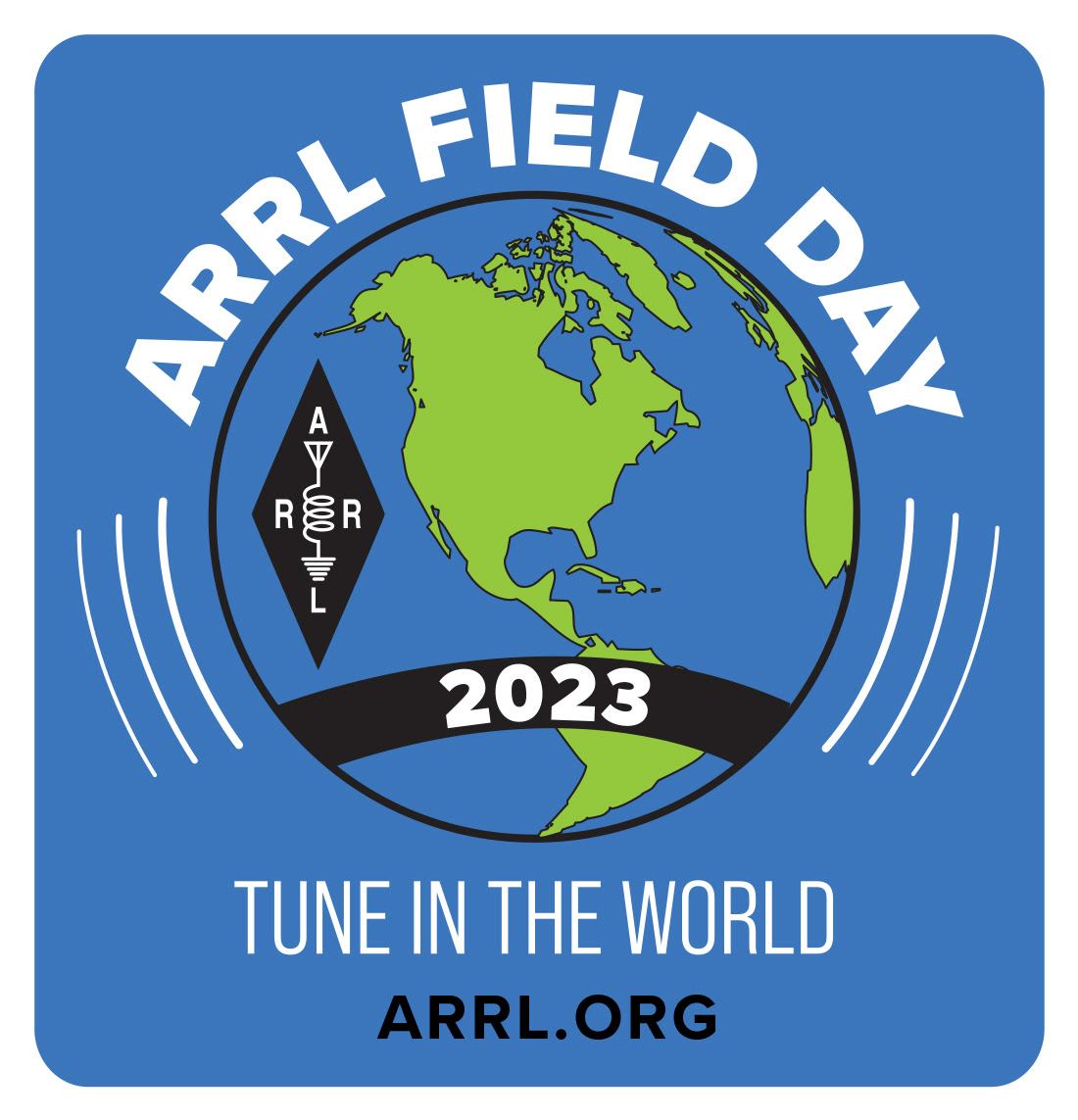 also a great chance to show the public and local agencies just what amateur radio is all about. Invite the local newspaper or radio / TV station to visit. Let’s all try to put our best face on, so the fun and capability of amateur radio has a chance to shine. Set up a Get On The Air station for new hams to make those first contacts. Field Day may also be the first chance to get the club out and have a team event after a long stretch of virtual meetings. Information is available at www.arrl.org/field-day. The most important part of Field Day is to make friends and have fun making contacts. Get out and get on the air.
also a great chance to show the public and local agencies just what amateur radio is all about. Invite the local newspaper or radio / TV station to visit. Let’s all try to put our best face on, so the fun and capability of amateur radio has a chance to shine. Set up a Get On The Air station for new hams to make those first contacts. Field Day may also be the first chance to get the club out and have a team event after a long stretch of virtual meetings. Information is available at www.arrl.org/field-day. The most important part of Field Day is to make friends and have fun making contacts. Get out and get on the air.
Clubs Working Together
The West Palm Beach Amateur Radio Group (WPBARG) and the Fair Lawn (NJ) Amateur Radio Club (FLARC) have agreed to a unique partnership in sharing ideas, activities, and best practices to better encourage the growth and development of each other’s amateur radio club. “This relationship, while informal, has the potential to address a number of issues and ideas that we as a club could not do alone,” noted Nomar Vizcarrondo, NP4H, 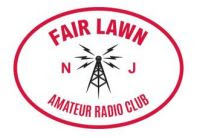
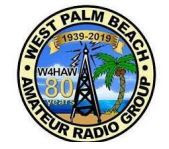
WPBARG (www.wpbarg.com) currently has approximately 80 members and meets regularly at the Cox Science Center and Aquarium in West Palm Beach. FLARC (www.fairlawnarc.org) has approximately 175 members and has a clubhouse as part of its association with the Borough of Fair Lawn. Both clubs are visible within their communities, and each brings its own set of diverse assets to the experiment. WPBARG recently shared a program on radio balloons built by local students, with the assistance of WPBARG club members and the FLARC. The first planned steps are to increase overall contact with each other on a regular basis via meetings, exchanges of communication, and the development of a potential joint program or project. The informal agreement will last for 1 year. Local clubs, of course, get together to do projects, but this is believed to be the first planned experiment in mutual development between clubs separated geographically.
By Ed Efchak, WX2R, and Michael Mathias, K1WX
Amateur Radio Operators Help During Emergencies
Once upon a time, not so long ago, in 1988, and not so far away, in Orinda, California, a troop of Girl Scouts needed a project for their Gold Award. One of the dads was a licensed ham radio operator and a member of the Orinda Amateur Radio Team, or OART. The seven Scouts decided to learn Morse code and get their licenses. “This was the beginning of the Miramonte High School Radio Club,” said Diana Wilde, who served as their troop leader.
Since 1988, the OART has grown into today’s Lamorinda Area Radio Interest Group (LARIG). The FCC granted a license to LARIG, with call sign K6ORI, in 2007, and Keith Riley has been the Trustee since. In 2012, LARIG was incorporated as a non-profit 501(c)(3) corporation. LARIG has evolved to serve two purposes. First, LARIG serves as a hub for amateur radio operators, who help with training, licensing, and supporting new members. Riley has been an Elmer (a mentor) to newly licensed operators, and has helped many learn Morse code, which is no longer required to get a license. “Our goal is to bring together folks who have interest in radio operation and are willing to help the community, when needed,” he said at a weekly Tuesday morning coffee meet, over which he unofficially presides. The second purpose is to provide support for emergency operations, especially for major disasters and big events like the Orinda 4th of July parade and the NorCal Kids Triathlon.
When Hurricane Katrina hit Louisiana in August 2005, cell phones died and ham radios became the primary source of emergency communication traffic. During the Loma Prieta earthquake on October 17, 1989, many emergency organizations discovered they were unable to communicate with each other. “When all else fails, we rely on the amateur radio operators to provide communications when it really matters,” said Todd Gritzer, the recent president of LARIG. All emergency organizations now have amateur radios, including the city of Orinda, MOFD, Moraga, and Lafayette police departments, as well as educational institutions including Saint Mary’s College and all Lamorinda schools.
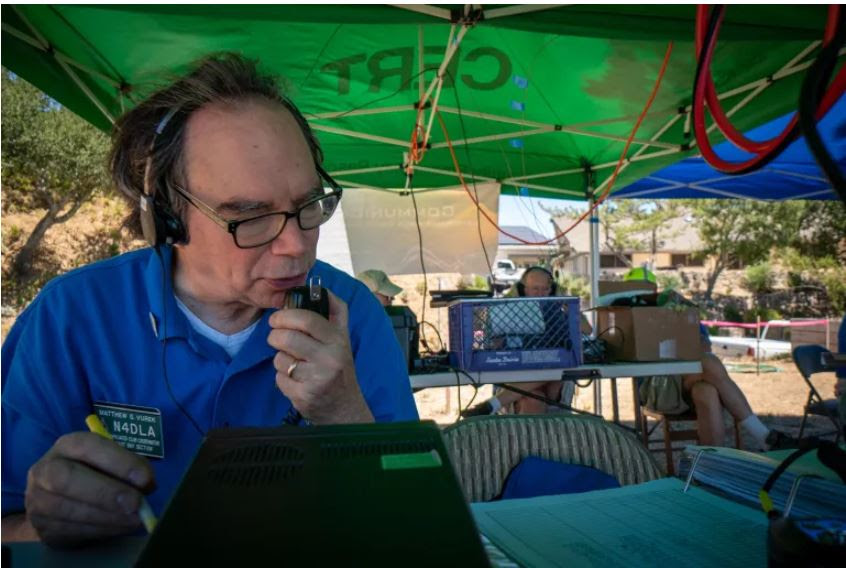 Matthew Vurek, N4DLA, makes a Field Day contact while working the group’s station at last year’s event. Matthew Vurek, N4DLA, makes a Field Day contact while working the group’s station at last year’s event. |
The Miramonte High School Ham Radio Club, established by the Girl Scouts in 1990, continues to function. “We have helped two members get their licenses this year and have repaired the school’s base station,” said Club President Ryan Kaelle, KN6OJE. Over the years, the term “ham radio” has segued to “amateur radio,” recognizing the purely personal aim of the individuals and “without pecuniary interest.” “They are anything but amateurs,” said MOFD’s Emergency Preparedness Coordinator, Dennis Rein. “They bring an impressive and interesting set of technical knowledge that is essential for communication during an emergency.”
The FCC uses three levels of licenses for amateur radio: Technician, General, and Extra; each requires passing an exam. However, anyone can get a General Mobile Radio Service, or GMRS, license from the FCC without an examination. Basic handheld radios are inexpensive and highly recommended for staying in contact with family members during an emergency. LARIG currently maintains and operates three K6ORI UHF (ultra high frequency) voice repeaters and three GMRS repeaters, one of each in Orinda, Moraga, and Lafayette. The repeaters are needed to overcome the hilly terrain and extend the range of the radios. LARIG also programs the radios that MOFD’s Community Emergency Response Team, or CERT, volunteers use. This team has two portable repeaters to deploy during emergencies. “My wife Sandi and I were introduced to the GMRS radios when we went through CERT training. We got hooked and took our exams to get amateur radio licenses,” said Gritzer. LARIG members conduct an annual Field Day to ensure all equipment is in working condition, and they clean the space around the East Bay Hills repeater regularly. The Lafayette repeater was installed in a resident’s house on a hill. Recently, when the resident decided to move, his neighbor offered his house for the repeater. The volunteers worked through a weekend to move the equipment and antenna to the new location.
Local amateur operators’ backgrounds include businessmen, pilots, doctors, engineers, homemakers, photographers, artists, and firefighters. Their common bond is using a radio and helping the community. LARIG is always looking for new people to learn and join the community. Visit www.larig.org for more information. “I started coming for the technical stuff, but now I come for the enjoyable company,” said Carol Alvord, KK6ENT, LARIG’s newest member.
By S. K. Gupta, The Orinda News
VOTA Update
The yearlong operating event recognizing volunteers continues to attract attention both online and on the bands. With favorable conditions and near-record 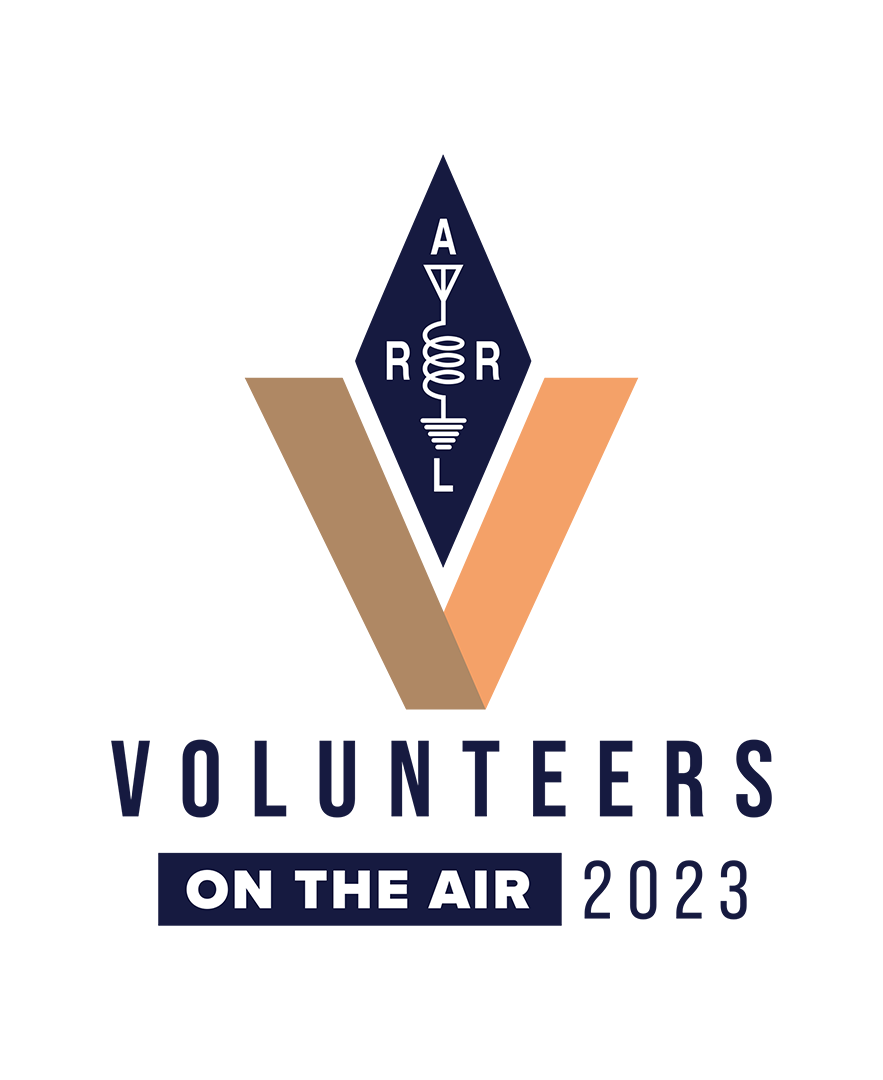 turnouts for operating events, many hams are getting the chance to contact more and more ARRL volunteers. We encourage you to take a look at the website for the latest schedule and list of volunteer points. More information is being added as we go. W1AW/ stations are being activated each month, and this is your chance to contact as many as possible.
turnouts for operating events, many hams are getting the chance to contact more and more ARRL volunteers. We encourage you to take a look at the website for the latest schedule and list of volunteer points. More information is being added as we go. W1AW/ stations are being activated each month, and this is your chance to contact as many as possible.
From my home station in Connecticut, I have been having a great time with 100 W and my vertical antenna on 10 meters. I have not been able to say that for quite a while. If you have not already done so, check out the website and get on the air. A special thanks to the volunteers who have built applications for the events.
The Indian River Amateur Radio Club Participated in the Florida SET
On April 22, 2023, the Indian River Amateur Radio Club (IRARC) participated in the Florida statewide SET, “Service Denied,” simulating a cyberattack that affected multiple communications channels and services throughout the state.
At 9:00 AM, IRARC called a net on the local 2-meter repeater at 145.37 MHz using the repeater call sign, W4NLX. Participants were encouraged to submit simulated reports of local effects of the cyberattack. The net was run from the club’s EmComm site at the River of Life Assembly of God Church. At this location, IRARC maintains a complete EmComm center with radio capabilities covering UHF, VHF, HF, and GMRS in all modes, including digital. The EmComm is the child of David Lerret, KU0R, club treasurer, who set up and maintains the location. Control operator for the net was Steve Luchuk, N4UTQ, club president, assisted by David Lerret, KU0R.
Multiple members, including David Slawson, K4UZM; Bob Scorah, W0AGE, and Armando Delgado, KN4JN, submitted traffic to the net following the advised protocol of preamble and closing the message with “FOR THE EXERCISE,” to clarify that this was a simulation. One of the traffic messages was sent via a local GMRS repeater. Several other members checked into the net, although they did not relay traffic.
The EmComm center, as well as many club members, monitored all the state active nets, including the SARnet through the Cocoa repeater at 444.65 MHz and both HF nets at 7.244 MHz and 7.268 MHz.
Toward the end of the exercise, the EmComm center forwarded a summary of the club activity to KE4EOC in Tallahassee via HF Winlink.
Although not used during this exercise, IRARC runs a monthly simplex net to test members’ capability to communicate in case repeaters are down. This net, at 147.42 MHz, is popular and receives check-ins from not just the central portion of the county, but from both north and south ends, as far away as 15-20 miles.
By Armando Delgado, KN4JN, club secretary
Reminder: ARRL Member Dues Survey
ARRL members are encouraged to participate in the dues survey, open until May 31.
The ARRL Learning Center kicked off the Club Development Webinar Series with the first webinar on March 30. This event focused on the role of the club secretary. More than 130 participants attended the session presented by Mike Aimone, WA8AHZ. Mike is the Affiliated Club Coordinator in Virginia and was joined by Kathy Lamont, KM4TAY. Both have experience as the secretary of their club. If you were unable to join the live webinar, the recording is available on the ARRL Learning Center at learn.arrl.org. Future webinars will also be recorded and available in the Learning Center for members to view.
The next webinar will take place on May 25th at 7 PM Eastern Time. The subject of the next event is “Developing a Club Website.” If you are interested in watching live, register at Club Development Series. Please join us, and feel free to pass this to others who may be interested.
Opportunities at ARRL
ARRL is looking for a few good folks. If you happen to live in the general area of Newington, Connecticut, and have an interest in working for the national association for amateur radio, take a look at open opportunities. The current list is available at Employment Opportunities (arrl.org). These are paid positions and are located at Headquarters. Current opportunities exist in Development, Membership, and the Lab. Skills required vary from entry level to highly skilled. Review the opportunities and let’s see if you are the right fit. You can truly make an impact on amateur radio while enjoying a rewarding career with ARRL.
Submitting Info for this Newsletter
ARRL Club News is for radio clubs to show how they are working in the community and the hobby to advance amateur radio. If your club completes a project, supports an event, does an EmComm activation, or activates a park, we want to hear about it. You can submit your newsletter article to us at clubs@arrl.org. We like to get them as text or Word files instead of PDFs. If you have pictures, please submit them with caption information, as well as the name and call sign of the photographer. We want to highlight the good work being done by the clubs and show others in the community. Think of this as a chance to show off your club and your programs.
How to Plan and Apply for an ARRL Hamfest or Convention
If your amateur radio club is planning to host a convention, hamfest, tailgate, or swapfest, please consider applying for it to be an ARRL-sanctioned event. To learn what it means to be an ARRL-sanctioned event, and to get some ideas on how to prepare for and conduct a hamfest or convention, visit www.arrl.org/arrl-sanctioned-
To have your event sanctioned, complete the online application at www.arrl.org/hamfest-
The ARRL Hamfests and Conventions Calendar can be found online at www.arrl.org/hamfests. In addition, the Convention and Hamfest Calendar that runs in QST each month also presents information about upcoming events.
Important Links
ARRL Home: www.arrl.org
Find an ARRL Affiliated Club: www.arrl.org/clubs
Find your ARRL Section: www.arrl.org/sections
Find a license class in your area: www.arrl.org/class
Find a license exam in your area: www.arrl.org/exam
Find a hamfest or convention: www.arrl.org/hamfests
Email ARRL Clubs: clubs@arrl.org






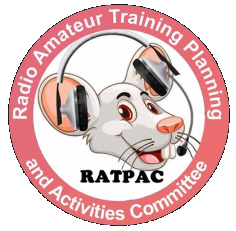
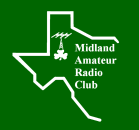




 Total views : 3300064
Total views : 3300064